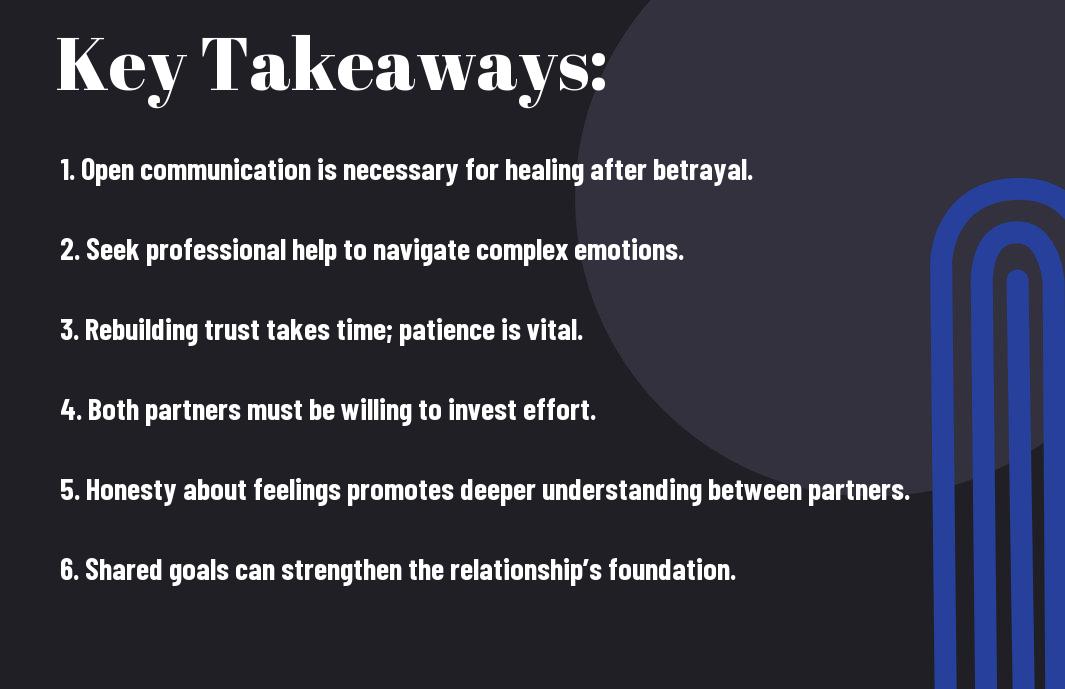There’s a painful reality that many couples face: infidelity. If you find yourself questioning whether your marriage can be salvaged, you are not alone. This blog post gathers insights from real couples who experienced the tumult of betrayal and emerged with stories of healing and reconciliation. By venturing into their journeys, you can discover the tools and perspectives that can help guide your own path forward. Is your marriage worth saving? Let’s explore the possibilities together.
Key Takeaways:
- Healing takes time, and couples should be prepared for a long journey of rebuilding trust.
- Open communication is imperative; discussing feelings and concerns openly can facilitate understanding.
- Professional counseling can provide valuable support and guidance for couples navigating the aftermath of infidelity.
- Both partners need to be willing to put in the effort to mend the relationship and address underlying issues.
- Forgiveness is a process; it may not happen instantly, and both partners need patience.
- Revisiting and redefining the relationship boundaries and expectations can help strengthen the bond.
- Couples may find hope and resilience through shared experiences and stories of others who have successfully moved forward.

Understanding Infidelity
Before exploring into the complex world of infidelity, it’s necessary to recognize that it can occur in various forms, each with its own implications for relationships. Understanding the dynamics at play is the first step in figuring out whether your marriage can be salvaged after such a betrayal.
Types of Infidelity
The following table outlines different types of infidelity that you might encounter:
| Emotional Infidelity | Where deep emotional connections are formed outside the marriage. |
| Physical Infidelity | Involves sexual encounters with someone other than your partner. |
| Cyber Infidelity | Engaging in online relationships or chats that betray trust. |
| Multiple Partners | Involves engaging with more than one person concurrently. |
| One-Night Stands | Short-lived sexual relationships without emotional commitment. |
Perceiving the type of infidelity can profoundly guide your healing journey and help in understanding your partner’s motivations.
The Impact on Relationships
Above all, infidelity can leave deep scars in a marriage, often leading to questions about trust and commitment. It’s vital to acknowledge that the aftermath of such an event can manifest in various ways.
Impact of infidelity on relationships often involves a rollercoaster of emotions including anger, betrayal, and confusion. You may find yourself questioning your self-worth, the validity of your relationship, and the future you envisioned with your spouse. While it may feel overwhelmingly negative, addressing these feelings can also lead to healing and personal growth. Open communication, counseling, and building a new foundation can turn the situation around, making it possible for the marriage to evolve positively.
Real Couples’ Stories
It is often said that infidelity can redefine relationships, but many couples have emerged stronger after enduring such a betrayal. Through candid share their personal stories, you can gain insights into navigating this complex emotional terrain and finding a renewed connection despite the challenges faced.
Overcoming Betrayal
With each individual’s journey, overcoming betrayal involves facing the pain of mistrust, navigating emotional turmoil, and stepping towards forgiveness. Couples often recount how honest communication, vulnerability, and time became imperative in reclaiming their relationship and rebuilding emotional intimacy.
Paths to Healing
Along your healing journey, you may find that establishing boundaries, seeking therapy, and engaging in open dialogue are vital steps in fostering emotional recovery. Prioritize safety and respect in your conversations.
Understanding that healing is a personal process can significantly impact your recovery. Take the time to explore your feelings and needs, and be open to support through counseling or support groups. This journey might involve forgiveness, but it also demands that both partners actively commit to honesty and transparency. Only by openly addressing the wounds can you both rediscover trust and find a healthier path forward together.

Seeking Professional Help
Despite the pain and uncertainty that infidelity brings, seeking professional help can guide you through the healing process. Couples often find that a trained therapist can facilitate open communication, rebuild trust, and provide tools for reconciliation. If you’re interested in learning more, check out Surviving Infidelity: The Truth About Reconciling After … for insights into the journey ahead.
Marriage Counseling
Any couple dealing with infidelity can benefit from marriage counseling. A professional counselor creates a safe environment for you and your partner to express your feelings, explore underlying issues, and develop strategies for moving forward together.
Support Systems
At times, surrounding yourself with a solid support system is vital. Your friends and family can provide emotional backing and newfound perspectives as you navigate the complex feelings resulting from infidelity. This support might also help to counter the isolation you may feel during this challenging phase, giving you the strength to confront difficult conversations and decisions. Additionally, consider joining support groups where others share similar experiences, helping you recognize that you are not alone in your struggles.

Communication Strategies
Not only is effective communication vital for healing after infidelity, but it also lays the groundwork for a more robust relationship moving forward. You must create safe spaces to talk openly, where both partners can express their feelings and thoughts without fear of judgment or escalation. Establishing ground rules for discussions can help facilitate understanding and connection.
Open Discussions
One of the most effective ways to begin the healing process is through open discussions. You should commit to discussing your experiences, feelings, and the impact of infidelity honestly. This transparency not only fosters understanding but also helps eliminate misunderstandings that could further harm your relationship.
Rebuilding Trust
An important component of overcoming infidelity is rebuilding trust between you and your partner. It requires patience, transparency, and a commitment to change. You need to demonstrate reliability over time, addressing insecurities and acknowledging past mistakes while creating a new foundation for your relationship.
At this stage, establishing trust means being open about your feelings and actions. You must consistently show that you are willing to commit to the relationship. Regular check-ins can help you gauge each other’s comfort levels, while demonstrating accountability in daily actions fosters a sense of security. It’s imperative that you avoid secrets and actively engage in discussions about boundaries and expectations. Through patience and determination, both partners can gradually restore a sense of trust, leading to a healthier and more resilient relationship.
Coping Mechanisms
For couples navigating the aftermath of infidelity, establishing effective coping mechanisms is vital. It’s necessary to find strategies that work for both partners, creating a foundation for healing. You may consider engaging in open communication, seeking professional counseling, or practicing self-care. Each couple is unique, and discovering what resonates with you will help rebuild trust and strengthen your bond.
Individual Healing
About your personal journey after infidelity, it’s important to prioritize individual healing. You may have feelings of anger, sadness, or betrayal that need to be addressed. Take the time to reflect on your emotions and seek support through therapy or trusted friends. Understanding your feelings can provide clarity and help you decide how to move forward in your relationship.
Shared Recovery Practices
By engaging in shared recovery practices, both you and your partner can foster trust and intimacy post-infidelity. Establishing rituals such as regular date nights, open dialogues about feelings, or joint counseling sessions can strengthen your connection and allow you to heal together.
Due to the sensitive nature of rebuilding after infidelity, actively participating in shared recovery practices can significantly impact your relationship. Activities like daily check-ins, attending couples therapy, or engaging in new hobbies together can reinforce your bond. By prioritizing time for one another, you create an opportunity to express feelings and maintain a supportive environment, which is necessary for healing after such a betrayal.
Moving Forward Together
All relationships require effort, but after infidelity, moving forward together demands a new level of commitment. You and your partner must work on rebuilding trust and ensuring that both of your emotional needs are met. This journey can be challenging, yet it presents an opportunity for deeper connection and understanding. Through open communication and a shared vision for the future, you can lay the foundation for a stronger, more resilient bond that will carry you through future challenges.
Setting New Boundaries
On your path to healing, establishing new boundaries is important. You and your partner should openly discuss what behaviors are acceptable and which are not, clearly defining each person’s emotional and physical limits. This step not only creates a sense of security but also fosters accountability and respect within the relationship.
Strengthening the Partnership
Before you can fully heal, it’s important to focus on strengthening the partnership between you and your partner. Activities that encourage teamwork, such as planning adventures or setting mutual goals, help rebuild a sense of unity. Open dialogue about individual needs and expectations also plays a significant role in forging a deeper understanding of one another.
Forward momentum in your relationship may involve making both small and significant changes. Engaging in quality time together can help to reignite the emotional spark that may have dimmed. Celebrate accomplishments, both big and small, which reinforce your connection. Consider attending therapy or engaging in structured communication exercises to help navigate complex emotions. By investing in these efforts, you are actively participating in the journey toward a resilient partnership, filled with trust and mutual respect.
Final Words
With these considerations, it’s clear that healing from infidelity is a challenging but possible journey for you and your partner. The stories from real couples illustrate that with openness, communication, and commitment to change, many relationships can be rebuilt stronger than before. While every situation is unique, seeking professional guidance and being willing to work together can help you navigate this complex process. Embrace the opportunity for growth, and allow yourselves the space to heal and redefine your relationship moving forward.
FAQ
Q: What steps can couples take to begin healing after infidelity?
A: Healing after infidelity involves open communication, transparency, and a willingness to understand each other’s feelings. Couples can start by having honest conversations about the reasons behind the infidelity, both from the betraying partner’s perspective and the hurt partner’s feelings. Many find it beneficial to seek the guidance of a professional therapist who specializes in infidelity, as they can provide tools and strategies to rebuild trust and intimacy.
Q: Do all relationships have the potential to recover from infidelity?
A: While every relationship is unique, many couples have successfully rebuilt their marriage after infidelity. Success often depends on both partners’ commitment to healing and working through the underlying issues that contributed to the betrayal. Factors that can influence recovery include a sincere apology, accountability from the betraying partner, and a mutual desire to improve the relationship. However, not all couples may choose to stay together, and that is also a valid decision.
Q: How long does the healing process typically take after infidelity?
A: The healing process can vary widely for each couple, depending on individual circumstances and emotional readiness. It might take several months to years for some couples to completely move beyond the betrayal and fully rebuild trust. It’s imperative to approach this time with patience and to avoid rushing the process, as each partner will navigate their emotions and recovery at their own pace.
Q: What role does forgiveness play in moving forward after infidelity?
A: Forgiveness can play a significant role in healing after infidelity, but it must be approached thoughtfully. The betrayed partner may need time to process their feelings before they can consider forgiving the betraying partner. Forgiveness does not mean forgetting or condoning the actions; rather, it is about letting go of the anger and resentment that can hinder healing. It can be helpful to discuss and define what forgiveness looks like for both partners in the context of their relationship.
Q: Can sharing stories from other couples who have overcome infidelity help?
A: Yes, sharing and hearing stories from other couples who have faced infidelity can provide hope and insight. It often reassures couples that they are not alone in their struggles and that recovery is possible. Listening to others’ experiences can foster understanding of different approaches and strategies that have worked for various couples, potentially helping with their unique healing journey. It’s important, though, to focus on one’s own relationship and find a personalized path forward.
